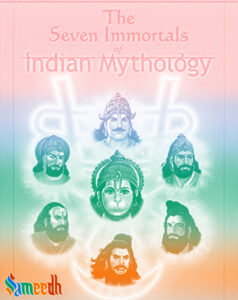In Hinduism, Chiranjeevis are believed to be immortal or long-lived beings who exist throughout the duration of the current cosmic cycle (Kalpa). The term “Chiranjeevi” is derived from Sanskrit, where “Chiranjeevi” means “immortal” or “long-lived.” These beings are mentioned in various Hindu scriptures and epics, and they hold significant cultural and religious importance.

In Hindu mythology, the Chiranjeevis, or “immortal beings,” are said to have been granted immortality by various deities or due to their exceptional virtues and merits. The reasons for their immortality vary according to different accounts and legends. The concept of Chiranjeev is is closely tied to Hindu mythology and folklore, with different texts mentioning different individuals as Chiranjeevis.
The seven Chiranjeevis commonly mentioned in Hindu texts are:
- Ashwatthama: He was the son of Dronacharya, the royal guru of the Kuru princes in the Mahabharat epic. Ashwatthama possessed divine qualities and was granted immortality by Lord Krushna but cursed to suffer from eternal pain and roam the earth as an outcast. Ashwatthama’s immortality signifies the enduring consequences of actions and the importance of accountability.
- Mahabali: Also known as Bali, he was a virtuous and mighty king of the Asura (demon) race. Bali was renowned for his generosity and righteousness. He was granted immortality by Lord Vishnu and allowed to reside in the netherworld (Patal). His timeless significance lies in his devotion, sacrifice, and the importance of righteousness, which transcends boundaries of caste or species.
- Vyasa: Vyasa is a revered sage and the author of the Mahabharat, as well as the compiler of the Vedas and Purans. He is considered one of the greatest sages in Hindu tradition and is believed to still reside in the Himalayas, imparting wisdom to seekers. His timeless significance lies in his role as a repository of knowledge, emphasizing the importance of wisdom, education, and preservation of cultural heritage.
- Hanuman: Hanuman is the devoted disciple of Lord Ram in the Ramayan epic. He possesses great strength, wisdom, and devotion. Hanuman is believed to be an incarnation of Lord Shiv and is revered for his loyalty and selflessness. His immortality signifies the eternal presence of divine devotion and the power of service to God and humanity.
- Vibhishan: Vibhishan was the younger brother of the demon king Ravan in the Ramayan. He chose to ally himself with Lord Ram during the war against Ravan due to his devotion to righteousness. Vibhishan was granted immortality by Lord Ram and became the king of Lanka after Ravan’s defeat. His immortality serves as a reminder of the eternal reward for choosing the path of righteousness, even in the face of adversity.
- Kripacharya: Kripacharya was one of the royal gurus of the Kuru dynasty in the Mahabharat. He was renowned for his martial skills and wisdom. Kripacharya was granted immortality by Lord Krushna and continues to impart knowledge to seekers. His immortality highlights the timeless importance of knowledge, moral guidance, and virtuous conduct.
- Parashuram: Parashuram is the sixth avatar of Lord Vishnu. He was a fierce warrior sage who wielded an axe (parashu) and was known for his dedication to upholding righteousness and destroying evil. Parashurama is believed to still reside on earth, serving as a guide to seekers. His immortality signifies the timeless presence of divine justice and the perpetual battle against injustice.
Collectively, the Chiranjeevis embody timeless virtues, teachings, and qualities that guide and inspire devotees across generations. Their stories serve as reminders of the enduring significance of devotion, righteousness, wisdom, and service in leading a purposeful and virtuous life.
In Hindu mythology, the Chiranjeevis, or “immortal beings,” are said to have been granted immortality by various deities or due to their exceptional virtues and merits. The reasons for their immortality vary according to different accounts and legends. Here are some common explanations for why the Chiranjeevis are immortal:
- Boons from Deities: Some Chiranjeevis were granted immortality as a result of boons or blessings bestowed upon them by powerful deities. For example, Hanuman was granted immortality by Lord Brahma, while Ashwatthama was granted immortality by Lord Krushna.
- Curses and Blessings: In Hindu mythology, curses and blessings often play a significant role in shaping the destiny of individuals. Some Chiranjeevis, like Ashwatthama, were cursed to live forever as a punishment for their misdeeds, while others, like Vibhishana, were blessed with immortality as a reward for their righteousness and devotion.
- Divine Favor: Certain Chiranjeevis, such as Vyasa and Kripacharya, are believed to have been favored by the gods due to their exceptional wisdom, knowledge, and virtuous conduct. They were granted immortality as a mark of divine recognition and appreciation for their contributions to humanity.
- Service to the Divine: Chiranjeevis like Hanuman and Vibhishana are revered for their unwavering devotion and selfless service to the divine. Their dedication to their respective lords and their willingness to sacrifice themselves for the greater good earned them immortality as a mark of divine appreciation and acknowledgment.
The Chiranjeevis are celebrated figures in Hindu mythology and symbolize various virtues, teachings, and aspects of divinity. They are believed to continue to exist in some form throughout the ages, serving as sources of inspiration and guidance for humanity.